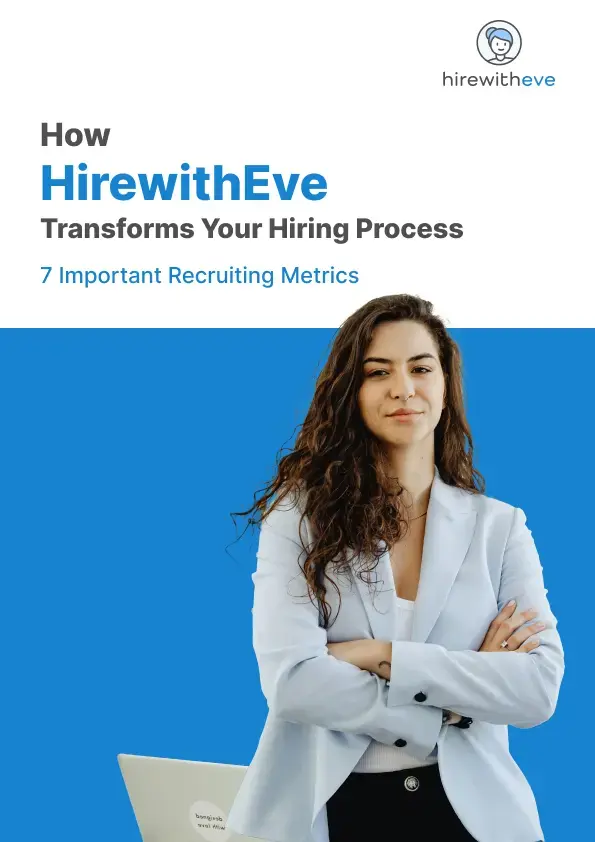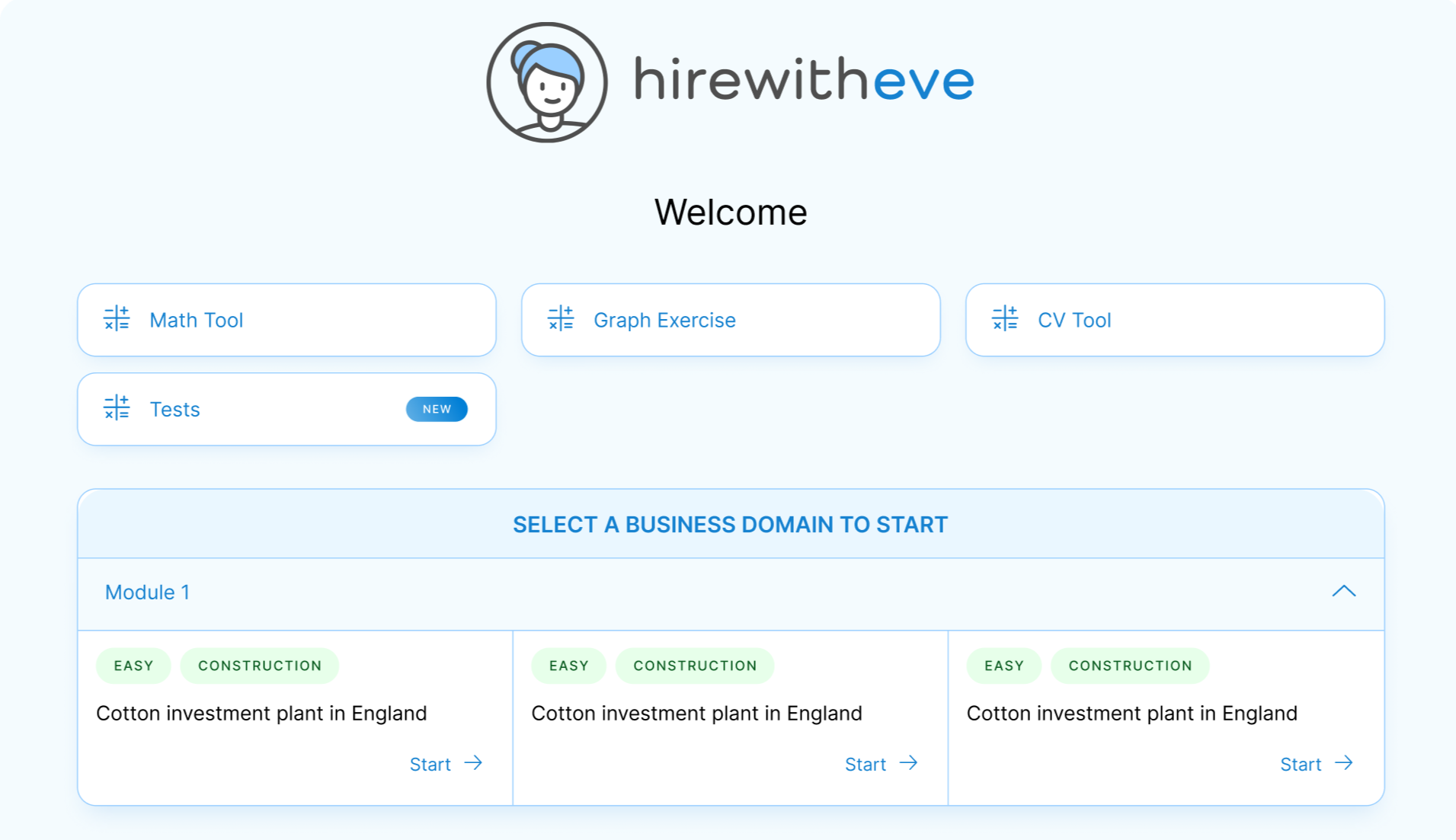Effective Candidate Screening Methods: How to Filter Out Unqualified Candidates

As a recruiter or HR manager, one of the most daunting tasks you face daily is filtering out unqualified candidates to build a pool of qualified talent efficiently. With the growing number of applicants vying for every open position, the challenge has only intensified. The influx of candidates, exacerbated by the global economic downturn and simplified job application processes, has made it increasingly difficult to sift through countless resumes to find the right fit.
Table of contents
The Challenges of Filtering Unqualified Candidates
10 Ways to Filter Out Unqualified Candidates
Why HirewithEve is the Ultimate Solution for Talent Acquisition
Conclusion
The Challenges of Filtering Unqualified Candidates
In the post-COVID era, unemployment rates have fluctuated dramatically, leading to an oversaturation of the job market. This has resulted in candidates, particularly those new to the job market or with minimal experience, applying for a wide array of positions indiscriminately. Moreover, the ease of applying to jobs online with just a few clicks has further contributed to the avalanche of applications recruiters now face.
A decade ago, you might have received only a handful of applications for a single job posting. Today, it’s not uncommon to sift through hundreds of resumes for the same position. This increase in volume underscores the need for efficient and effective candidate screening methods.
10 Ways to Filter Out Unqualified Candidates
Detailed Job Descriptions: Your First Line of Defense
One of the most effective ways to filter out unqualified candidates is to provide a detailed and specific job description. A well-crafted job description should outline every requirement for the position, including necessary skills, location, working hours, salary structure, and years of experience.
However, many recruiters make the mistake of leaving out critical details, which can lead to an influx of irrelevant resumes. For example, omitting the exact location of the job can result in candidates applying who are unwilling or unable to commute. Similarly, providing a broad experience range (e.g., 2-7 years) instead of a specific range (e.g., 4-5 years) can invite a flood of unqualified applicants.
Collaborating with team members who are directly involved in the role can help ensure that the job description is comprehensive and accurately reflects the position’s requirements.
Leveraging Advanced Filters for Efficient Screening
Many job boards offer advanced filtering options that allow you to narrow down your candidate pool based on specific criteria such as location, salary expectations, experience, and even keywords in resumes. By using these filters effectively, you can significantly reduce the number of irrelevant applications you need to review.
Boolean operators, for example, can be particularly useful when searching for candidates with specific skill sets. For instance, using the search string “bookkeeper AND US accounting, not Indian accounting” can help you find candidates with the precise experience you need.
Screening Questions: Ensuring Candidate Relevance
Despite your best efforts in crafting a detailed job description, many candidates will still apply without thoroughly reading it. This is where screening questions can be invaluable. By incorporating questions that test key requirements directly from your job description, you can ensure that only candidates who meet your criteria proceed to the next stage of the hiring process.
For example, if you’re hiring a senior bookkeeper, you might ask applicants how many years of relevant experience they have or how many accounting entries they can process per hour. This approach not only saves time but also improves the quality of candidates in your pipeline.
The Power of Video Responses in Candidate Evaluation
Even with advanced filtering and screening questions, you may still receive applications from candidates who are not a good fit. Requesting a video response is an excellent way to further assess a candidate’s experience, motivation, and personality before proceeding to more in-depth interviews.
A video response allows you to see how candidates present themselves, gauge their communication skills, and determine their level of enthusiasm for the role. It’s also an opportunity to give candidates a problem to solve or to ask them to explain why they believe they are the best fit for the position.
Implementing Skill Tests for Accurate Candidate Assessment
Once you’ve narrowed down your candidate pool to those who meet your initial criteria, the next step is to assess their skills directly. Pre-employment skill tests are a powerful tool for this purpose. Whether you’re hiring a JavaScript developer or a bookkeeper, giving candidates a relevant skills test can provide invaluable insights into their capabilities.
Platforms like HirewithEve offer a vast library of questions and skill assessments that can be tailored to your specific hiring needs. By incorporating these tests into your recruitment process, you can ensure that only the most qualified candidates advance to the next stage.
Evaluating Culture Fit: The Modern Recruitment Necessity
In today’s globalized and diverse workplace, assessing a candidate’s fit with your company’s culture has become increasingly important. Hiring for culture fit goes beyond evaluating a candidate’s skills and experience; it involves determining whether their values, work style, and personality align with your organization’s culture.
This can be particularly challenging, as “culture” is a broad and often subjective concept. However, with the right tools, you can develop customized culture-fit tests that help you assess candidates on these criteria. Platforms like HirewithEve offer solutions that enable you to evaluate culture fit as part of your overall candidate assessment process.
Conducting Telephonic Interviews for Preliminary Assessment
Once you’ve shortlisted candidates who meet your qualifications and align with your company’s culture, a telephonic interview is an excellent way to further assess their suitability. This step allows you to evaluate a candidate’s aspirations, motivation, and personality without the need for a more time-consuming face-to-face interview.
Telephonic interviews can save both time and resources, enabling you to quickly determine whether a candidate is worth considering for the next stage of the recruitment process.
The Importance of Reference Checks in Recruitment
Reference checks are a crucial step in verifying a candidate’s qualifications and experience. According to research, a significant percentage of candidates lie about their qualifications or exaggerate their experience on their resumes. By conducting thorough reference checks, you can ensure that the candidates you’re considering are as qualified as they appear to be.
Pay attention to inconsistencies in the information provided by candidates and be cautious of overly positive references that may not paint an accurate picture of the candidate’s abilities.
Utilizing Applicant Tracking Systems for Streamlined Hiring
An Applicant Tracking System (ATS) is essential for managing your recruitment process efficiently. An ATS helps you track candidates, manage resumes, automate the screening process, and schedule interviews. It also reduces unconscious bias by using technology and AI to evaluate candidates based on objective criteria.
Embracing Automated Recruitment Tools for Efficiency
Today’s recruitment landscape is vastly different from what it was a decade ago. With the advent of automated recruitment tools, many aspects of the hiring process that once required significant time and effort can now be streamlined and automated. These tools can handle everything from preparing skill tests to evaluating candidates’ logical and cognitive abilities through aptitude tests.
Why HirewithEve is the Ultimate Solution for Talent Acquisition
Given the challenges of filtering out unqualified candidates and the importance of efficient recruitment processes, HirewithEve emerges as the ultimate solution for talent acquisition. The platform offers a comprehensive range of features designed to help recruiters and HR managers streamline their hiring processes and build a pool of highly qualified candidates.
Key features of HirewithEve that are particularly relevant to this topic include:
Culture Fit Assessments: HirewithEve enables you to incorporate culture fit assessments into your hiring process, giving you deeper insights into candidates’ suitability for your organization.
Applicant Tracking System (ATS): The platform’s ATS helps you manage your recruitment process from start to finish, automating key tasks and reducing bias in candidate selection.
Conclusion
The recruitment process can be overwhelming, particularly when faced with a flood of unqualified candidates. However, by implementing the right strategies and utilizing advanced tools like those offered by HirewithEve, you can streamline your hiring process and ensure that you build a pool of highly qualified candidates who are the right fit for your organization.
Target Your Talent
Unlock tailored solutions for your recruitment and hiring needs with Eve Platform's extensive case study library.
Subscribe now to enhance your HR expertise and excel in your role.
Free Resources

Transforming Hiring: 7 Key Recruiting Metrics
Enhancing recruitment processes with data-driven insights for better hiring outcomes.

Reducing Hiring Bias with Hirewitheve.
Utilizing Hirewitheve to combat bias and streamline recruitment processes effectively.

Hiring Detail-Oriented Candidates
HirewithEve enhances hiring by accurately assessing candidate's attention to detail-oriented.








